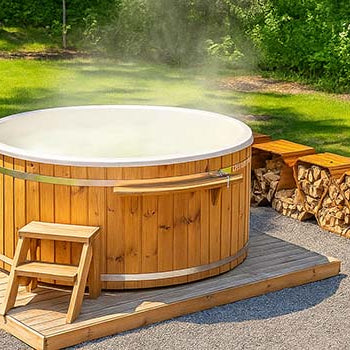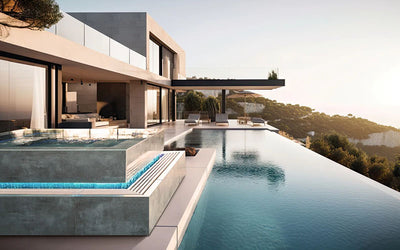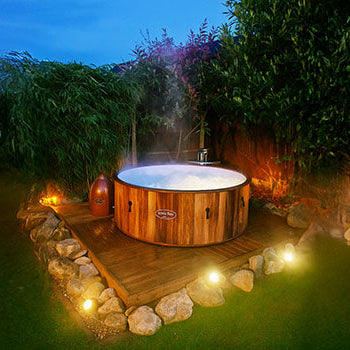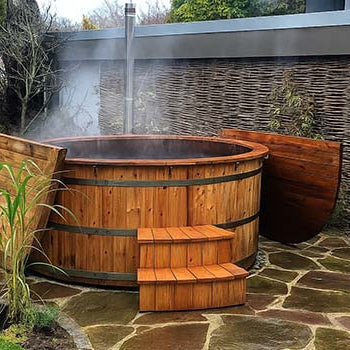Thinking of splashing out on a hot tub?
Short answer: yes, they’re worth it, if you love relaxing muscles, boosting your mood, and turning your garden into a private spa. From sleek acrylic models to hardy rotomoulded tubs and rustic wooden soakers, there’s a hot tub for every personality. The question is: Are you ready for the soak and the upkeep?
Let’s break it down and see what makes a hot tub a worthy investment, or not.

The Hot Tub Dream: Why Are People Asking "Are They Worth It?"
Understanding the Appeal: Relaxation, Luxury, and Lifestyle
Picture it: cold evening, stars above, a steamy soak with your favourite drink in hand. That’s the hot tub dream, and it’s pretty tempting.
For many, it’s not just about comfort. It’s about creating a space to breathe, unwind, and escape. Whether you're recovering from work stress or craving family connection, hot tubs offer a little slice of luxury at home.
Setting Expectations: Beyond the Bubbles
But here’s the reality: hot tubs aren’t magic. You don’t just plug one in and forget about it.
They take planning, cleaning, and a bit of ongoing TLC. If you’re looking for effortless relaxation, you’ll need to put in a little effort first.
So before you dive in, know that it's a lifestyle choice, not just a one-time purchase.
Weighing the Pros: The Many Benefits of Owning a Hot Tub
Health and Wellness Advantages
Hot tubs offer more than warm water, they bring real physical benefits.
Heat and hydrotherapy can ease stiffness, improve circulation, and loosen tight muscles. Many users even notice a difference in joint mobility over time.
For those managing chronic conditions, that daily soak can be a lifesaver.
Stress Reduction and Deep Relaxation
Feeling burnt out? Ten minutes in a tub can change everything.
That combination of warmth, massage, and silence resets your nervous system. It’s not just relaxing, it’s restorative.
Use it as a post-work ritual or your secret Sunday reset.
Pain Relief: Soothing Muscles and Joints (incl. Arthritis)
If you struggle with backaches, sore knees, or arthritis, a hot tub might become your favourite form of relief.
Warm water reduces inflammation and loosens joints, while jets target those stubborn pressure points. Many arthritis sufferers say it helps them stay mobile.
Improved Sleep Quality: Your Path to Restful Nights
Struggling with sleep? Try soaking before bed.
That gentle drop in body temperature after a hot bath signals your brain it’s time to rest. It’s a natural wind-down that helps you fall asleep faster and stay asleep longer.
Potential Cardiovascular Perks
Research suggests that regular hot tub use may help lower blood pressure and improve heart function in some people.
It mimics the effect of light exercise, without breaking a sweat. Always consult your doctor if you have heart concerns, but for many, it’s a gentle boost.
Hydrotherapy for Exercise Recovery
After a tough workout, there's nothing like slipping into warm water.
Hydrotherapy reduces soreness and speeds recovery by increasing blood flow to tired muscles. Professional athletes use it, and now you can, too, right in your backyard.
Lifestyle and Social Enhancements
Hot tubs aren’t just for alone time. They bring people together.
From date nights to family chats, a hot tub becomes a screen-free zone where conversations flow. It’s hard to scroll when your hands are underwater.
Creating a Year-Round Backyard Oasis (Even in UK Weather)
Worried about the rain? Snow? British winters?
With the right setup, your tub is usable year-round. Add some festoon lights, a pergola, and a couple of towels, and suddenly you’ve got a winter escape without leaving home.
Quality Time: Connecting with Family and Friends
In a world full of distractions, it’s rare to get everyone in the same place, relaxed and chatting.
Hot tubs create a space for connection, whether it's game night in bubbles or a peaceful evening chat with your partner.
Enhancing Your Home Entertainment Space
Hosting a birthday or just having the neighbours round?
A hot tub adds a wow factor to your outdoor setup. It transforms patios into party zones and gives guests something to rave about.
The Sheer Enjoyment Factor
Let’s be real, it just feels amazing.
The steam, the bubbles, the weightlessness. Sometimes, you don’t need a reason to relax. You just do.

Considering the Cons: The Potential Drawbacks of Hot Tubs
The Financial Commitment: Understanding Hot Tub Costs
Hot tubs aren’t cheap, and the costs don’t stop at checkout.
There’s the price of the tub, yes. But also installation, electricity, chemicals, and maintenance. It's a long-term expense, not a one-off splurge.
Initial Purchase Price Breakdown (Inflatable vs. Hard Shell)
Inflatable tubs can start as low as £400, but they won’t last long.
Rotomoulded tubs are a middle ground, offering decent durability without the high-end price. Acrylic hot tubs, meanwhile, range from £5,000 to £15,000 and often include better insulation, more jets, and premium finishes.
Installation Costs: Base, Electrics, and Delivery Explained
Expect to spend £500–£2,000 to prep your space.
You’ll need a solid base, a safe electrical setup, and possibly even crane delivery for larger units. Plan to avoid costly surprises.
Ongoing Running Costs in the UK (Electricity, Water, Chemicals)
Most owners spend £50–£100 monthly on energy, chemicals, and water.
Tubs with poor insulation or used daily in cold weather may cost more. Good insulation = lower bills.
Maintenance and Potential Repair Expenses
Pumps break. Covers tear. Jets clog.
Set aside £200–£400 annually for unexpected repairs or part replacements. Better to budget than be caught off guard.
The Time and Effort Investment
Hot tubs don’t run themselves.
Water testing, filter cleaning, and regular upkeep are essential. It's not difficult, but you need to stay on top of it.
Regular Maintenance: Is it a Chore?
It can be, if you’re not organised.
But many owners build it into their weekly routine. Just 10–15 minutes a week can keep your water crystal clear.
Space and Location Requirements
Small garden? Tight access?
You’ll need a level surface, room for delivery, and clearance around the tub. Measure twice before buying once.
Practical Considerations
Drainage. Lighting. Privacy.
Think about everything from where the water will go to how visible you’ll be to neighbours. A good location makes or breaks your experience.
Noise Levels and Neighbour Relations
Jets can hum. Conversations can carry.
If you’re close to neighbours, be considerate about usage times. It’s better to stay friendly than deal with complaints.
Health Risks and Safety Precautions (Water Quality, Usage Limits)
Dirty water isn't just gross, it’s risky.
Bacteria thrive in poorly maintained tubs, leading to infections or skin irritation. Clean regularly and follow safety guidelines.
Hot Tub Costs UK (2025): A Detailed Breakdown
Price Tiers: From Entry-Level to Luxury Models
What Do You Get for Your Money? (Features, Jets, Build Quality)
Cheaper tubs often skip on insulation, comfort, or features.
Higher-end models offer powerful jets, lighting, Bluetooth sound, and advanced filtration. More money usually means more longevity and fewer repairs.
Estimating Monthly Running Costs
Budget £50–£100, depending on frequency, size, and temperature settings.
Efficient models and smart usage can bring this down.
Electricity Consumption Factors (Insulation, Usage, Heat Pumps)
Better insulation keeps heat in. Less heating means less cost.
Using a heat pump instead of a standard heater can reduce your bills further.
Water Usage and Refill Costs
Tubs are typically drained and refilled every 3–4 months.
This means around 1,200–1,500 litres per cycle. The cost is modest, but essential.
Chemicals, Filters, and Essential Supplies Budget
Expect £200–£300 annually for sanitiser, filters, and test kits.
Proper water care avoids costly damage later.
Calculating the True Cost of Ownership Over Time
A £7,000 tub used for 10 years, with yearly costs of £800, adds up to £15,000 in total investment. Use it 3 times a week? That’s about £3 per session. Worth it?
Mastering Hot Tub Maintenance: What's Really Involved?
Your Regular Maintenance Schedule (Daily, Weekly, Monthly, Quarterly)
-
Daily: Check cover, skim debris
-
Weekly: Test and balance water
-
Monthly: Rinse filters
-
Quarterly: Full clean, drain and refill
Essential Water Chemistry Explained (pH, Alkalinity, Sanitiser - Chlorine vs Bromine)
Balance keeps your water clean and skin safe.
Cleaning Filters, Shell, and Cover: Best Practices
Rinse filters weekly, deep-clean monthly.
Wipe the shell with spa-safe cleaner. Keep the cover dry and clean to avoid mildew.
Troubleshooting Common Issues (Cloudy Water, Foam)
Rinse before soaking and shock as needed.
Time Commitment vs. Professional Servicing Options
DIY maintenance is doable, but if you're short on time, pro services cost £100–£250 per year. It’s peace of mind if you’d rather not DIY.
Is a Hot Tub a Good Investment in Your Well-being and Home?
Lifestyle Fit: How Often Will You Really Use It?
If you’ll use it weekly or more, it’s worth considering.
But if it’s a once-a-month novelty, you might be better off with spa vouchers.
Comparing Alternatives: Saunas, Pools, Spa Days
Each has pros. Pools are cool in summer. Saunas are dry and hot. Spa days are luxurious but fleeting.
Hot tubs sit in the middle, relaxing, wet heat, and always ready when you are.
Impact on Home Value: Myth vs. Reality
Not every buyer loves them.
But a well-maintained tub can make your home feel more luxurious. It’s a lifestyle perk, not a guaranteed ROI.
Long-Term Value: Quality vs. Price Considerations
Buy cheap, buy twice.
Spending more upfront saves money on repairs and upgrades down the line.

The Verdict: Should You Invest in a Hot Tub?
Key Questions to Ask Yourself Before Buying
-
Do I have the space and setup?
-
Will I use it regularly?
-
Can I commit to cleaning and upkeep?
-
Does it fit my lifestyle and budget?
Summarising the Trade-Offs: Cost vs. Benefit
Hot tubs are relaxing, social, and healing. But they cost time, effort, and money.
If you’ll use it and maintain it, the benefits easily outweigh the downsides.
Making the Decision That's Right for You
Still on the fence? Visit a showroom. Try a friend’s tub. Ask questions.
When you’re ready, choose the model that fits your life, not just your wishlist.








